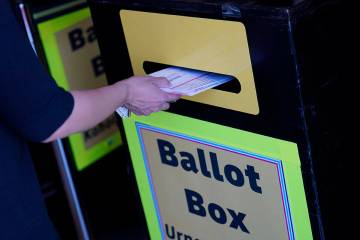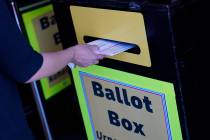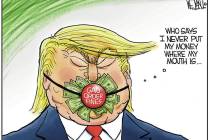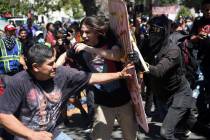COMMENTARY: Helping Nevada’s human trafficking survivors to be truly free
I was preparing for my first day of training as a cashier at a casino when the company called and told me not to show up after all. I was devastated. I needed a job — badly. I still do. Rent is due, and my wallet is empty. But I was not surprised. I have a criminal record for prostitution.
Like many survivors of human trafficking, I have gotten used to the fact that, as a result of my record, the world will to some degree always see me as nothing more than a hooker. I am used to it, but that does not mean I accept it. I am so much more than that. A bill pending before the Legislature would help, both to shift this unfair and destructive narrative and provide tangible relief for countless survivors of human trafficking as they work to rebuild their lives.
Senate Bill 173, introduced by state Sen. James Ohrenschall, D-Las Vegas, would expand existing state law, which allows human trafficking survivors to clear their criminal records in certain circumstances. The current law already has some strong provisions, especially when compared with other states. Some states offer no such relief at all to survivors of human trafficking, or limit relief only to those who were arrested as minors.
By contrast, Nevada provides “vacatur” of convictions for human trafficking survivors, rather than expungement or sealing of the records. Vacatur nullifies the previous conviction, making it like it never happened, while expungement and sealing limit who can access the survivor’s record but do not erase it completely. That’s the good news. The bad is that Nevada allows for vacatur under this statute only if the underlying crime is prostitution-related. This limitation leaves out a huge swath of survivors who were forced to commit other crimes, such as drug offenses or petty thefts.
This bill would not affect me directly. The charges on my record in Nevada are covered under existing law. But I know from experience what traffickers can make you do.
I was a teenager when my foster care caseworker set me up with my first trafficker, a man who expertly manipulated my pain and my love and then sent me to work in commercial sex. I did not have a gun to my head. I didn’t need one.
All it took was an expert warping my concept of love and playing on my already shaky sense of self-worth. His manipulation and abuse changed me in a way that made falling into a romantic relationship with my next trafficker feel normal. This is what love is supposed to be, right? You give everything you have because that’s what you do for the person you love, right? Manipulated, exploitative love still feels like love, still is love in some ways. If he had asked me to deal drugs, or commit another crime, I could not have said “no.” It was not within my power at that time. He knew it — and he knew exactly what he was doing. That is what human trafficking looks like in the real world. Love is more effective than a gun.
I have a lot of trouble thinking of myself as a survivor of human trafficking, let alone as a victim. I teach my children to take responsibility for their own actions, and I feel strongly that I have to do the same. I do not want pity. I want a job. I have worked as a dental assistant and would love to do so again. But that cashier’s job, when I thought I had it, felt like a dream come true. And then it wasn’t.
I know I am not alone. Many survivors have criminal records as a result of being trafficked. Those records stand in the way of healing and, in many cases, of eating or having a place to live. They stand in the way of freedom in any real, meaningful sense of the word. By supporting Sen. Ohrenschall’s bill, the Legislature can help those women, girls, boys and men find true emotional and economic freedom. I urge them to try.
Lisa Junior is a Las Vegas mother and founder of the Sheek Foundation, which seeks to empower survivors of human trafficking.




























